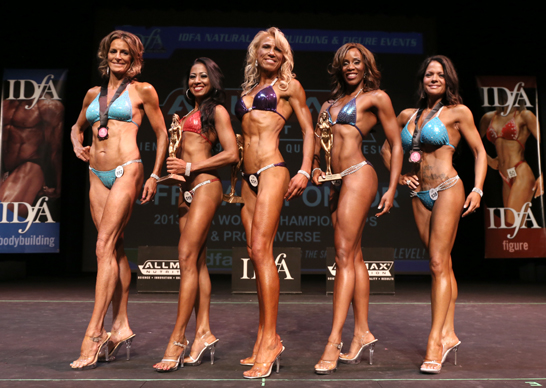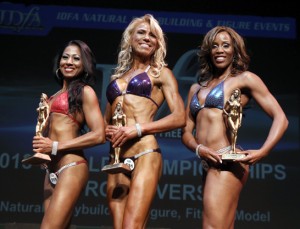
Sri Lankan-born fitness model Dhashi Perera Bartholomeusz with her fitness awards in Canada.
Sri Lankan-born fitness model Dhashi Perera Bartholomeusz won two international awards recently in Canada. She bagged second place Fitness Model Masters and fifth place Fitness Model short category at IDFA (International Drug Free Athletes) World Championships and Pro Universe held in Mississauga at the Meadowvale theatre.
Bartholomeusz, who showcased the Sri Lankan flag after her wins, studied at St. Lawrence’s Wellawatte and Ave Maria Convent Negombo before migrating to Canada in 1989 at the age of16 with her parents Cecil and Savitri Perera and two siblings Niluka and Dilan. She was proud of her Sri Lankan heritage, but she seized the opportunity to break down stereotypes against fitness models in the South Asian community.
“BE A GOOD ROLE MODEL TO OUR CHILDREN”
The fitness star, who is a mother of a 12 year-old, says her only regret was starting the sport late in her life and advocated a healthy lifestyle for parents of young children.
“Yes, I am married and I have a 12 year-old son. That doesn’t mean it’s the end of life. I juggle my work, home, my family and my fitness. That is called time management. If you don’t take care of yourself and your body no one will. And we should be a good role model to our children,” she said.

Dhashi Perera Bartholomeusz at the IDFA.
“It’s a lifestyle change, staying fit and making healthy food choices shouldn’t be a chore. I only wish I started this sport when I was younger. But I won’t let age slow me down and have regrets about it, but to thrive harder and make the best of it now.”
MANY CHALLENGES

Dhashi had many challenges in her career.
She says her family was hesitant to see her involved in this “extraordinary” sport, concerned to see her on regimented fitness diets and countless days hard physical training.
“When people think about body building, they automatically think of big muscles and women looking like men. It took me many months to prove to them that even though I do body building my focus has been more about fitness,” she told lankareporter.com.
“It is difficult for my family and my parents to watch me go through the many phases of the training and diet. I also don’t think that the Sri Lankan community is ready to see a woman fully participate in this sport. They need to be educated more about it.”
She thanked her husband Russel Barthlolomeusz, son Kyle, trainer/nutritionist Jesvy Paratholil, posing coach Tiziana Temple, training partner Tunde Tairu and siblings Nilu and Dilan as well as close friends and family.

Top 5 in Open Fitness Model IDFA.
“Mainly my husband Russel and son Kyle have been a great support system on and off season with training. They know how important fitness is to me and they make every effort to make things easier for me. They also know this is not an easy sport and they are very proud of what I do,” she added.
TOUGH TRAINING ROUTINE
Tough mental training is necessary for this sport according to Dhashi, who is a personal trainer and a boot camp instructor. For many in this sport, their mind gives up before their body, failing to keep up with strict dietary requirements.

Top Three in open Masters Fitness Model at IDFA.
“I train at least five to six days a week. Leading closer to the competition sometimes 2-3 times a day with a very strict and disciplined workout routine and diet plan. My diet consists of low carbs, no sodium, eating six to seven times a day, going to sleep early, waking up early to train, sacrificing social and family gatherings by taking my own food, etc.”
ROAD AHEAD
Dhashi says she is looking forward attaining pro status and getting more South Asian women to join her in the sport. Often, she finds herself as the “only brown girl” in the room, and too often, like other athletes across Canada, she finds herself looking for sponsors to cover training and competition costs.
